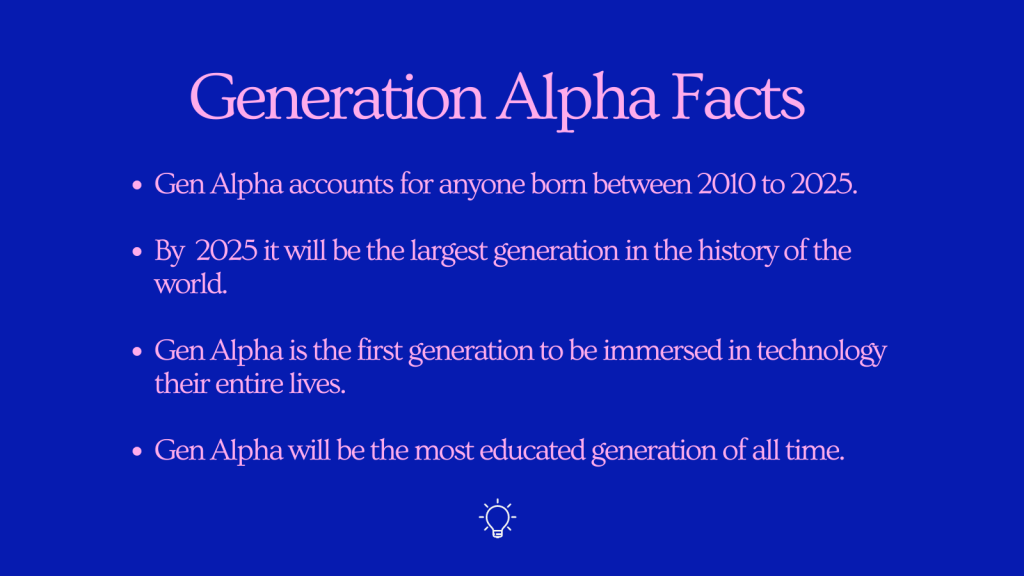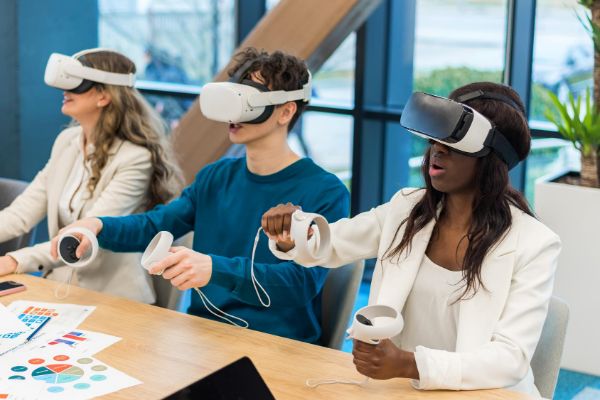In our rapidly evolving business world, Gen Alpha holds the key to shaping the future of organizations. Let’s delve into nine innovative strategies that HR managers should employ to attract and retain this extraordinary talent pool.
Image by katemangostar on Freepik
Generation Alpha: key character traits
While Generation Alpha is yet to step foot into the workplace, businesses must prepare for their arrival. By understanding their distinct characteristics and adapting employment strategies accordingly, organizations can create a favorable environment.
HR managers strive to build effective strategies for attracting and retaining Gen Alpha talent, it becomes imperative to understand the unique characteristics that define these people. Born into a world saturated with technology, they exhibit unparalleled digital fluency. Their innate ability to navigate multiple devices and platforms from an early age shapes their expectations and demands in the workplace.
What’s more, businesses should introduce new workplaces: when their time comes, 65% of Alphas will pursue career paths that currently do not exist.
Tech-savvy digital natives
Generation Alpha possesses a remarkable level of technological literacy. Unlike any previous generation, digital natives effortlessly navigate a multitude of tools and platforms from an early age.
Unparalleled exposure to devices and online platforms shapes the way youngsters interact with the world around them. They quickly adapt to new technologies, grasping their functionalities and exploring their possibilities.
And this extends beyond mere consumption. Generation Alpha actively engages with digital tools to create, innovate, and connect with others. From coding basics to content creation, young minds embrace digital mediums to express their creativity and communicate their ideas effectively.
For HR managers, recognizing and using Gen Alpha’s inherent technological proficiency is essential. By incorporating pioneering solutions created by leading software companies into current workplaces, organizations make a significant step toward attracting young talents in the future.
Diversity and inclusion advocates
Young people place a paramount emphasis on diversity, inclusion, and social justice. Growing up in an era marked by the increased visibility of social issues, Gen Alpha is acutely attuned to matters of equality and fairness.
Generation Alpha expects businesses to uphold these values in the workplace, not just pay lip service to them. They will definitely seek workplaces that reflect the diverse world they inhabit, where individuals from different backgrounds, ethnicities, genders, and abilities are given equal opportunities to thrive.
HR managers must create an inclusive workplace that aligns with the expectations of the young. Embracing diversity in recruitment practices, ensuring fair and unbiased decision-making processes, and providing equal access to growth and development opportunities are crucial steps in attracting and keeping young people.
Businesses need to show genuine commitment to social justice causes that resonate with youngsters. From addressing climate change to defending human rights, they desire to work for organizations that actively contribute to a better world. HR managers must showcase an organization’s alignment with Gen Alpha’s values.
Hyperconnected mindset
Unlike any other generation before them, today’s teens have access to a vast array of information and perspectives at their fingertips. From social media to online news platforms, they follow a multitude of global events and cultural influences and encourage diverse viewpoints. Their deep understanding and appreciation of the world’s interconnectedness are changing traditional notions of borders and boundaries.
To put Generation Alpha in the workplace successfully, companies should understand that the global mindset fuels their aspirations and career preferences. Though still at school, they already think of career opportunities that transcend geographical limitations.
Specialists working with human resources should recognize and leverage these peculiarities. Highlighting an organization’s international reach, cross-cultural initiatives, and opportunities for global collaboration can strongly resonate with young talent. Platforms for cultural exchange, diversity in the workplace, and international assignments appeal to the innate curiosity and desire to make a difference that young people have.
Image by Freepik
Collaborative and team-oriented people
Raised in an era where communication is not just a buzzword but a way of life, the new Generation Alpha values the power of collective intelligence. Their inherent value for collaboration and team activities has proven to be resilient in the face of the COVID-19 pandemic. Despite the challenges of that time, kids and teens adapted swiftly to virtual collaboration, using devices to stay connected.
Establishing cross-functional teams, promoting open communication channels, and implementing collaborative tools and platforms can create a space where the young can unleash their full potential.
Multitasking and adaptability
Thanks to their exposure to a fast-paced digital world, teens develop a remarkable ability to multitask and adapt to rapidly changing circumstances. Growing up surrounded by constant information, they seamlessly switch between tasks.
Their knowledge of various digital platforms helps them process abundant information on the spot, make quick decisions, and efficiently manage their time. In the future, these valuable character traits will help them navigate through complex tasks in the workplace.
What’s more, young people embrace rapid changes in technology, trends, and communication mediums with ease. They can effortlessly learn new tools, platforms, and digital innovations. This adaptability makes them welcome in workplaces where agility and flexibility are top priorities.
Putting Gen Alpha in the workplace: creating an engaging employer brand
As HR professionals think ahead to attract and retain talented individuals from the new Generation Alpha, it becomes imperative to establish a compelling employer brand that resonates with their unique values and aspirations.
Social impact initiatives
Alpha representatives have a strong desire to make a positive impact on the world around them. Therefore, companies must show their commitment to social initiatives and demonstrate how their work aligns with the values of youngsters.
You should stress your company’s dedication to social responsibility and sustainability. Young people will want to work for organizations that go beyond profit-making.
Show your involvement in meaningful causes by taking part in specific initiatives and philanthropic endeavors. This could include partnerships with nonprofit organizations, volunteering programs, employee-led initiatives in the workplace, or initiatives aimed at reducing the company’s environmental footprint.
Digital storytelling
Storytelling has developed into a powerful tool for connecting with audiences on a deeper level. To captivate and engage the new Generation Alpha, HR managers must leverage its potential to showcase their company culture, values, and the experiences of current employees. By utilizing compelling multimedia content, businesses can create an immersive and authentic narrative.
Videos serve as a dynamic medium to convey the essence of your corporate culture and values. Through exciting storytelling, you can give a glimpse into the day-to-day experiences in your workplace, achievements, and collaborative endeavors of your employees. Impactful visuals, music, and interesting narratives create an emotional resonance that leaves a lasting impression on young people. Interactive presentations offer another avenue to engage future specialists.
VR/AR experiences
By incorporating immersive solutions into their recruitment process, HR managers can give potential candidates a firsthand taste of their company’s work environment, projects, and challenges, effectively bridging the gap between imagination and reality.
This approach is a remarkable opportunity to showcase the intricacies of your workplace. Through virtual tours, candidates can explore your office spaces, facilities, and collaborative areas, gaining a sense of the mental and physical atmosphere.
Moreover, you can use AR/VR technologies to provide interactive experiences that simulate real-life projects and challenges. By creating virtual scenarios that mirror the type of work Alpha candidates would encounter within your organization, you can assess their problem-solving skills, adaptability, and creativity.
Image by frimufilms on Freepik
Flexible work arrangements
Remote work has emerged as a highly sought-after flexibility option for Gen Z. The next generation, Alpha, will be even more prone to this model.
Offering flexible start and end times, compressed work weeks, or the ability to personalize workplaces, you will attract more candidates willing to experience this favorable approach. This flexibility helps people optimize their productivity during their most focused hours while accommodating personal commitments, such as childcare, education, or hobbies.
You should establish transparent guidelines and policies to ensure that all employees feel supported and included.
Mentoring and reverse mentoring programs
Mentorship programs play a pivotal role in bridging the generational gap and facilitating the exchange of knowledge and experiences. That’s why you should elaborate sound strategies right now, before Alpha representatives will start seeking jobs.
By pairing junior employees with experienced professionals, as well as introducing reverse mentoring programs, your company can cultivate a vibrant learning ecosystem that benefits both the mentors and mentees.
Traditional mentoring programs offer valuable guidance and support from top-notch experts. Simultaneously, reverse mentoring programs give a unique opportunity for young people to share their digital proficiency, innovative ideas, and fresh perspectives with older generations. These recognize the unique skills and experiences that young people bring to the table, such as technological fluency, social media savviness, and creative problem-solving abilities.
Continuous learning and development opportunities
Continuous learning is crucial to support the growth and development of young employees. You can embrace the following practices:
- Workshops and traineeships
Introduce such programs in your workplace to meet the specific needs and interests of young people. They cover a broad range of topics, including technical skills, leadership development, communication, and problem-solving.
- Mentorship programs
Mentors can offer career advice, help navigate challenges in the workplace, and provide a supportive environment for professional growth.
- eLearning platforms
Online courses, webinars, and educational materials help the young learn at their pace and explore a variety of subjects.
- Internal learning communities
Creating employee-led interest groups, knowledge-sharing forums, or lunch-and-learn sessions fosters a collaborative learning environment within the workplace. These communities encourage employees to share their expertise, engage in peer-to-peer learning, and collaborate on projects or initiatives.
- Performance feedback and development plans
Regular feedback and conversations are essential to support one’s professional growth. Organizations should recognize achievements and help employees identify areas for improvement and skill enhancement.
Collaborative and agile work environments
By creating a culture that emphasizes teamwork, encourages innovation, and facilitates frequent communication, your company can unlock its full potential.
- Cross-functional projects
By assembling multidisciplinary teams comprising individuals from different departments, you can tap into the unique perspectives, skills, and experiences of Alpha employees.
- Open feedback channels
Establishing such channels is crucial for creating an environment where Alpha employees feel free to share their ideas, concerns, and suggestions.
- Agile methodologies
Agile strategies push for repeated and gradual workloads, enabling groups to quickly adapt to revised objectives and customer requirements.
- Frequent communication
Alpha representatives value communication. In the future, young people will need it in the work environment. Therefore, introduce team meetings, instant messaging platforms, and video conferencing, to facilitate seamless information flow.
- Inclusive decision-making
By valuing diverse perspectives and involving the young in the decision-making process, your company can benefit from innovative thinking, fresh insights, and the ability to challenge conventional wisdom.
Employee wellness programs
If you show concern about the health of your personnel, this will attract talented candidates in the future. By implementing wellness programs that address both physical and mental health, you create a supportive and thriving workplace.
- Wellness challenges
These can range from step count competitions to nutrition goals or mindfulness practices. By fostering friendly competition and offering rewards or incentives, you can engage your staff members in healthy behaviors.
- Meditation sessions
Conducted in person or virtually, these sessions allow employees to take a break from their busy schedules and engage in mindfulness practices.
- Fitness classes
Providing on-site or virtual fitness classes enables people to prioritize their physical health and engage in regular exercise.
- Access to mental health resources
Recognizing the importance of mental health, you should provide access to resources that support the psychological well-being of your employees.
- Work-life balance initiatives
Your company can implement policies and initiatives that encourage flexible work arrangements, such as remote options, flexible schedules, or extended parental leave. These will help employees manage their personal and professional responsibilities effectively, reducing stress levels and enhancing overall satisfaction.
Image by Drazen Zigic on Freepik
Recognition and rewards
Teens appreciate it when their achievements are acknowledged. No doubt, they will need support and encouragement in the future as well, when they set off on their professional journey. So, try to develop a comprehensive recognition and rewards program to show genuine appreciation for the efforts and accomplishments of your employees.
- Personalized rewards
Offering personalized rewards allows organizations to recognize unique talents, interests, and preferences. These can be financial bonuses, gift cards, or paid time off for personalized career development opportunities, such as attending conferences or training programs.
- Public recognition
Publicly recognizing the achievements of your specialists not only boosts their morale but also creates a sense of pride and belonging within the organization.
- Unique experiences
Offering unique experiences as rewards can create memorable moments for employees, fostering a strong sense of loyalty and commitment.
- Peer-to-peer recognition
You can establish a platform or programs that allow Alpha employees to acknowledge and appreciate each other’s contributions.
- Continuous feedback and coaching
Regular feedback allows Alpha representatives to understand their strengths, areas for improvement, and progress toward their goals.
Conclusion
As we bridge the gap from Z to Alpha, we should embrace innovative strategies to create workplaces where young people can thrive, make a meaningful impact, and shape the future of the companies they work for.
HR managers must introduce efficient strategies to attract and keep Gen Alpha in the workplace. By understanding their unique characteristics, they can tailor employment approaches and create engaging brands.










Leave A Comment